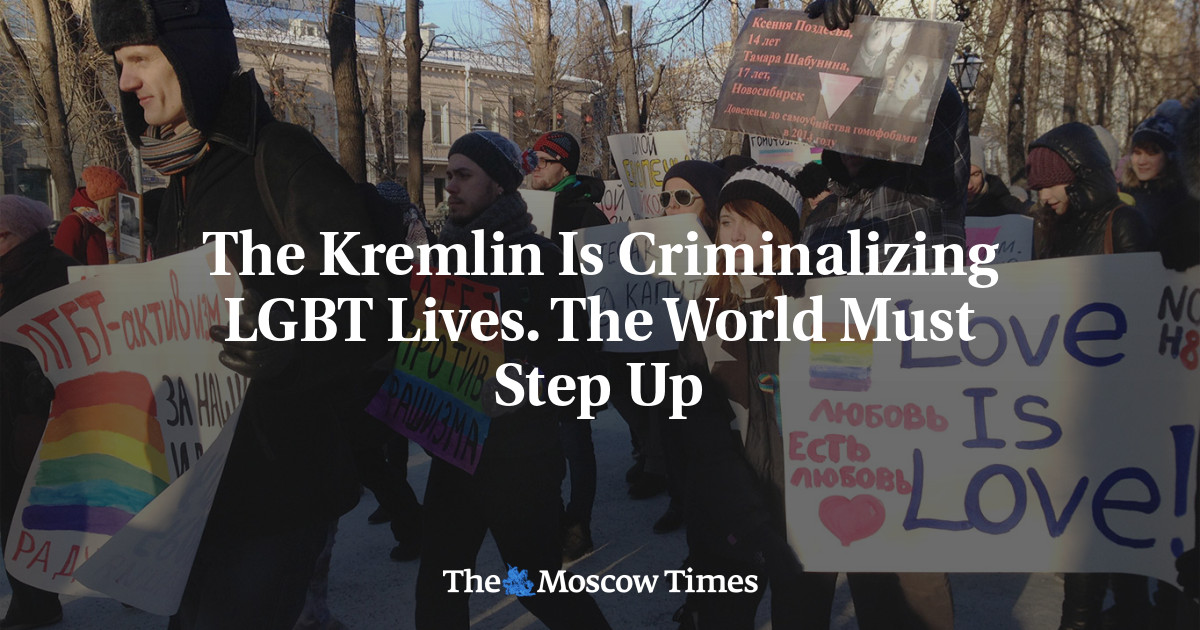
Russia’s Justice Ministry is seeking to ban the so-called “international LGBT public movement” as extremist, a move that could criminalize all LGBT activism. Intriguingly, no such movement actually exists as an organization. This vague targeting increases the likelihood that, in the worst-case scenario, ordinary LGBT people may find themselves falling into the authorities’ net by simply trying to live their lives.
In Russia and beyond, numerous charities and NGOs tirelessly advocate for and support the country’s LGBT community. Yet their efforts have faced mounting challenges for years. The recent expansion of the LGBT propaganda law to encompass anything that could “promote” LGBT topics to any age group, coupled with the introduction of the transgender ban this summer, has significantly complicated the work of these vital organizations as the ability to disclose the nature of their assistance openly is severely restricted.
As the number of individuals seeking aid continues to rise, the resources available to these groups remain unchanged or even decrease, creating a challenging environment for both the organizations and those in need of support. As legal barriers mount, the number of individuals in urgent need of relocation advice, legal aid, psychological help and financial assistance surges. This evolving situation underscores the crucial need for sustained, robust support for LGBT advocacy and aid efforts within Russia.
Although the exact consequences of the impending Supreme Court decision are currently unclear, two stark outcomes are evident. First, this ruling will further marginalize the queer community, especially its most vulnerable members such as transgender individuals and queer people of color. Second, by labeling the LGBT community as extremist, Russia will be compounding its track record of human rights violations, deepening Russia’s international isolation from countries that value norms of equality and inclusivity.
The impending court decision is set to cast a long, ominous shadow over the LGBT community. This ruling will not only intensify the sense of insecurity that compels many queer people to hide their identities, but it is also likely to encourage hate crimes and forced outings. Moreover, even a queer person who is not involved in activism might be considered an extremist if, for example, they are stopped by the police and found to have a queer-themed Telegram chat with their friends.
Activist groups and charities face the grim prospect of operating in secrecy, as any association with an extremist organization could lead to imprisonment. The situation for these groups is becoming increasingly perilous. LGBT support initiatives and activists operating within Russia are being forced underground. This is compounded by shrinking financial support from international donors, leaving organizations with far fewer resources to do their vital work.
Another alarming consequence of this judicial shift is the potential reclassification of cases initially deemed mere administrative offenses for so-called LGBT propaganda. These cases, previously subject to fines, may now be escalated to criminal offenses, often resulting in imprisonment.
Furthermore, lawyers are expected to become far less willing to represent LGBT people. Representing someone accused of extremism, even when such accusations stem from baseless claims of LGBT propaganda, carries the risk of being declared an extremist yourself. This reluctance is understandable, even if lawyers themselves recognize the absurdity of the situation. This chilling effect further increases the vulnerability of the LGBT community in Russia, as they face ever harsher penalties with diminishing access to legal defense.
This unfolding crisis will undoubtedly lead many queer individuals in Russia to consider leaving the country in the hope of finding safety and acceptance elsewhere. Currently, there are insufficient initiatives that could help them do this. LGBT-friendly countries are not providing the amount of support they should. It is crucial that these nations provide a route to safety by simplifying asylum processes and providing temporary humanitarian visas for people fleeing repression.
However, it’s important to remember that a significant number of queer people will remain in Russia, as evidenced in other countries with similarly repressive laws. Emigrating requires a level of resources and privilege that many queer people do not have. Within these communities, individuals often suppress their identities in the face of acute marginalization. Their lives are focused on survival. Their continued existence is a testament to the enduring spirit and solidarity queer individuals show even in the face of overwhelming adversity. This constant reminder of the importance of global support and advocacy for LGBT rights, not just in providing a way out, but also in sustaining and empowering those who continue to live in challenging environments.
In conservative societies like Russia, the most vulnerable groups are often the first to bear the brunt of the state’s increasingly oppressive measures. Underprivileged communities are disproportionately affected by the war in Ukraine. Russian regions with non-Slavic majorities are suffering higher mobilization and death rates than wealthy metropolises like Moscow and St. Petersburg.
The recent anti-trans law, which stripped transgender people of the right to access gender-affirming care and change their gender markers on official documents, further illustrates this worrying trend. History shows such actions are often a prelude to broader oppressive measures. Recent restrictions on abortion rights in Russia, for example, appear to be a logical expansion of societal control mechanisms beyond LGBT issues.
Amid these developments, it’s vital to remember that nothing the Kremlin can do will stop queer people from existing in Russia. They deserve the fundamental right to safely live as themselves. The escalating crisis underscores the urgent need for effective, discreet, and compassionate support for Russia’s LGBT community.
This systematic oppression, while increasingly isolating Russia on the global stage, also indicates a growing need for assistance and support to affected communities. As their situation deteriorates, it’s likely that more individuals will seek help both domestically and internationally. The trend underscores the importance of the international community’s vigilance and the support of activist organizations in countering these oppressive actions and providing aid to those most in need.
The views expressed in opinion pieces do not necessarily reflect the position of The Moscow Times.



